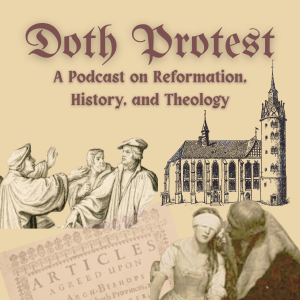Doth Protest
Doth Protest is a podcast on church history and how the theology of the 16th-century Reformers can inform us today. It is hosted by Anglican priests the Rev. Andrew Christiansen and the Rev. James Rickenbaker along with occasional co-host Stephen Burnett, a Roman Catholic layman. It also features interviews with theologians and scholars of church history. Show music is done by Aaron Shows. We can be listened to on Spotify, Apple Podcasts and more. Follow us on X @DothProtestPod, FB & Instagram @doth.pro_ref.pod
Episodes

Friday Dec 06, 2024
Friday Dec 06, 2024
Andrew comes on to share his thoughts on the 2024 movie "Bonhoeffer: Pastor, Spy, Assassin" and the way it has been received.
Links:Statement made by the International Bonhoeffer SocietyStatement made by actors of the Bonhoeffer film
Eric Metexas' book Bonhoeffer: Pastor, Martyr, Prophet, Spy.Charles Marsh's book Strange Glory: A Life of Dietrich Bonhoeffer
Podcast interview from Homebrewed Christianity with director of the movie (YouTube version)
Myles Werntz's review of the movie in Christianity Today

Thursday Sep 26, 2024
Thursday Sep 26, 2024
Andrew and James had a wonderful conversation with Joshua Nickel on his book Walk Between Heaven and Earth: Listening to Martin Luther On How to Be a True Theologian. Visit Josh's website https://joshuamarknickel.com/

Monday Sep 16, 2024
Monday Sep 16, 2024
The Reclamation joins forces with Doth Protest in this week's episode. Join Michael Lewis and Brad Kafer as we hear the stories of two Episcopal priests (James Rickenbaker and Kyle Tomlin) and how they each came to gospel clarity. We also discuss the fruits of Christ centered preaching and rightly understanding Jesus' disposition toward us as believers.

Thursday Aug 22, 2024
Thursday Aug 22, 2024
Renowned Luther scholar Volker Leppin comes on the podcast to for a great discussion on his most recent book Sola: Christ, Grace, Faith, and Scripture Alone in Martin Luther's Theology from Lutheran Quarterly Books and the famous debate between Martin Luther and Johann Eck in June and July of 1519 known as the Leipzig Debate which proved to be a turning point in Luther's understanding of Scripture's authority.
Volker Leppin is the Horace Tracy Pitkin Professor of Historical Theology at Yale Divinity School. Prior to Yale, he taught church history at University of Jena and University of Tübingen. He is the author of many books, monographs, and articles in church history, especially on the Middle Ages, the Reformation, and Martin Luther. He is especially known for his biography of Luther titled Martin Luther: A Late Medieval Life.
SHOWNOTES:
The works about Luther that Dr. Leppin mentions were significant for him were:
Karl Holl's "Luther", presented as a lecture on Oct 31st 1917.
Gerhard Ebeling's book Evangelische Evangelienauslegung: Eine Untersuchung zu Luthers Hermeneutik
Heiko Oberman's book Luther: Man Between God and the Devil
(Andrew also brought up Oberman's book The Dawn of the Reformation: Essays in Late Medieval and Early Reformation Thought)

Thursday Aug 01, 2024
Thursday Aug 01, 2024
Mickey Mattox joins Andrew and Stephen on today’s podcast to discuss Roman Catholic scholars who have contributed to the study of Martin Luther.
Dr. Mattox, a Roman Catholic theologian himself, is the Flack Family Foundation Chair and Professor of Theology at Hillsdale College. He has been lecturing and writing about Martin Luther for decades.
SHOWNOTES:
Some of Dr. Mattox’s books:
The Substance of the Faith: Luther’s Doctrinal Theology for Today (with Dennis Bielfeldt and Mark Mattes)Luther at Leipzig (Studies in Medieval and Reformation Traditions)Changing Churches: An Orthodox, Catholic, and Lutheran Theological Conversation (with A.G. Roeber)
Works referenced in this episode:-Heiko Oberman's classic Luther: Man Between God and the Devil
-Volker Leppin's book Martin Luther: A Late Medieval Life-Jared Wicks pro ecclesia article "Half a Lifetime with Luther in Theology and Living"-Dr. Mattox’s article “The Catholic Luther, Then and Now” from Lutheran Education Journal, Fall 2017
-the 1983 book Catholic Scholars Dialogue with Luther (by various Roman Catholic scholars of Luther discussed in this episode)

Saturday Jul 20, 2024
Saturday Jul 20, 2024
Andrew and James were blessed to be joined by church historian Gerald Bray. In this episode, Dr. Bray discusses his studies of the early church father Tertullian, how we got the Christian Bible, and how people in the early church read, received, and interpreted the Bible. Tune in for a fascinating conversation.Dr. Gerald Bray is research professor of divinity at Beeson Divinity School and distinguished professor of historical theology at Knox Theological Seminary. He is the author of many works, two of which we especially discuss in this episode:-Holiness and the Will of God: Perspectives on the Theology of Tertullian-How the Church Fathers Read the Bible: A Short IntroductionShownotes:-- The term from C.S. Lewis that Andrew could not think of in the moment was Chronological Snobbery-- The exact quote from JC Ryle (that Andrew also could not think of in the moment): "Let us never be surprised at the wickedness there is in the world. Let us mourn over it, and labor to make it less so, but let us never be surprised at its extent." from JC Ryle's commentary on Matthew.

Friday Jul 12, 2024
Friday Jul 12, 2024
Doth Protest hosts Andrew and James along with friend of the show Connor Longaphie of Transcendent Truth Media attempt to answer some of the questions that popular Roman Catholic apologist says are questions that "Protestants can't answer" in his book A Blue Collar Answer to Protestantism: Catholic Questions Protestants Can't Answer. But more importantly, we address why cheap polemics and logical fallacies, be they Catholic, Protestant, or whatever, never make for good theology.

Saturday Jun 08, 2024
Saturday Jun 08, 2024
We are joined by the Rev. Dr. Joel Scandrett, associate professor of historical theology at Trinity Anglican Seminary, who was also a friend and colleague of J.I. Packer. Together they edited an Anglican catechism To Be a Christian. Dr. Scandrett joins us to talk about Packer as he knew him. Toward the end of the episode, he and James discuss Lord of the Rings (as Andrew doses off).Works by mentioned by or about Packer mentioned in this episode:The Heritage of Anglican Theology (J.I. Packer)The Thirty-Nine Articles: Their Place and Use Today (J.I. Packer & R.T. Beckwith)"Fundamentalism" and the Word of God (J.I. Packer)J.I. Packer: His Light and Thought (Alister McGrath)

Wednesday May 22, 2024
Wednesday May 22, 2024
Dr. Ray Baker joins Andrew and James today to discuss C.S. Lewis' hermeneutics and approach to Scripture. It was such an enjoyable conversation.Shownotes: Dr. Baker's book that we referred to throughout the episode is Beyond Narnia: The Theology of C.S. LewisHere is a link to other articles and essays written by Dr. Baker

Saturday May 11, 2024
Saturday May 11, 2024
James and Andrew were delighted to be joined by Jon Moffit and Justin Perdue from the podcast Theocast. In this episode, we get into:1) What distinguishes a Reformed Baptist from most typical Baptists in North America (which is rather similar to what distinguishes Anglicans like Andrew and James from many Anglicans in North America)2) Discussing the 'better way': an alternative out of dead-orthodoxy and pietism3) The differences between Anglicans and Reformed Baptists on Baptism
Theocast's ministry and primary focus is to "encourage weary pilgrims to rest in Christ". Jon and Justin are both Baptists from a classical Reformed perspective. James and Andrew enjoyed this conversation as it highlighted much more of what unites us in Christ rather than what separates us in secondary matters. God Bless




